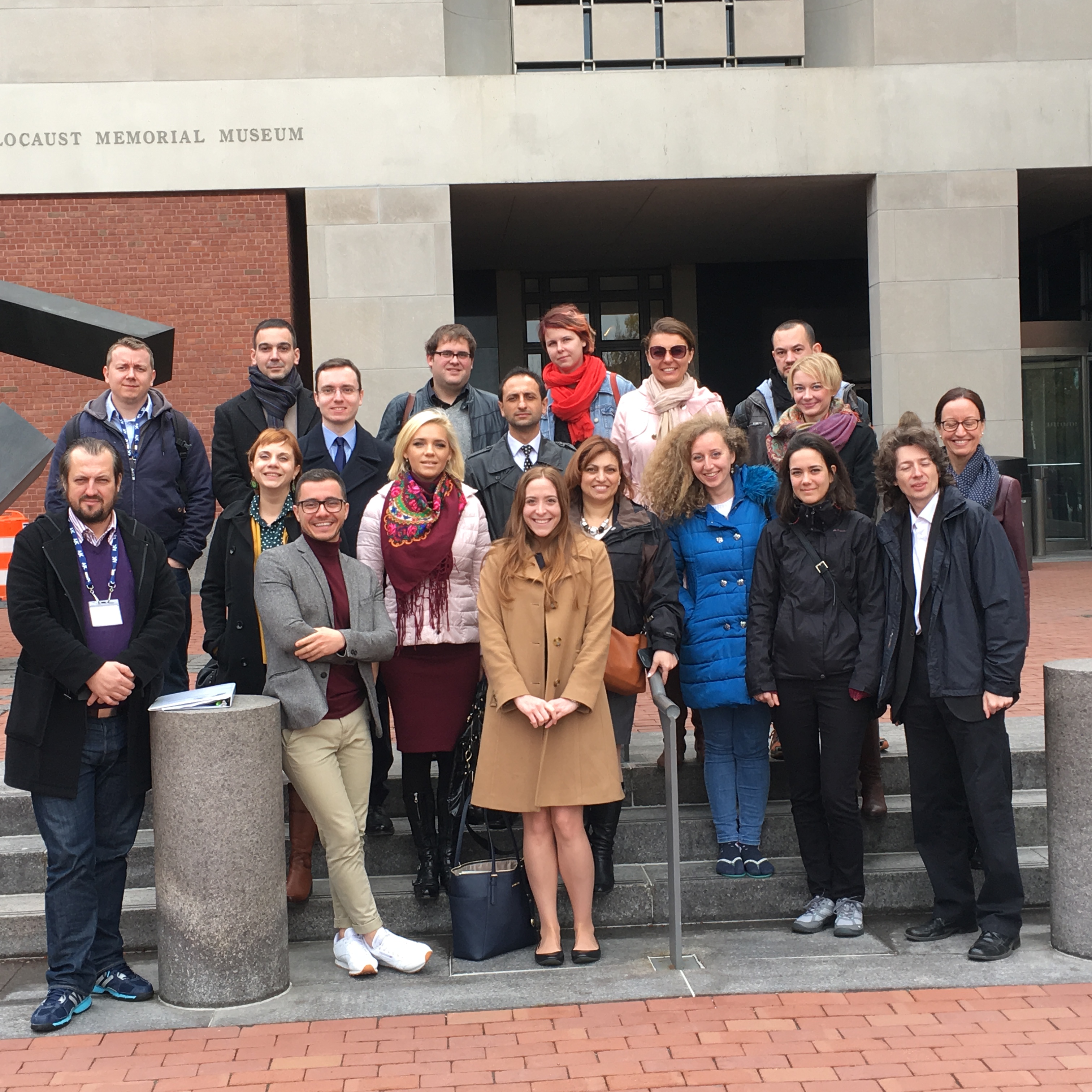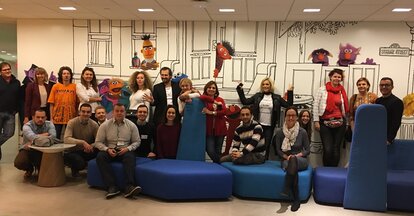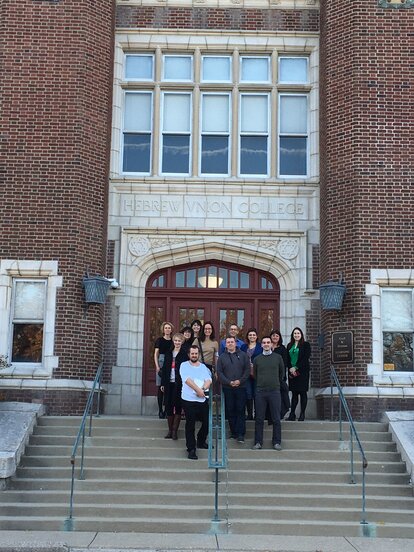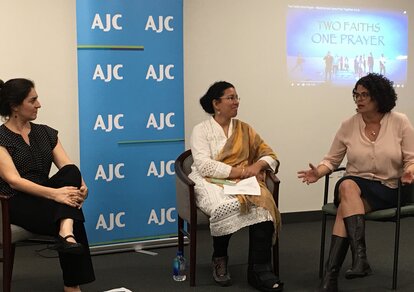Promoting Tolerance US Study Trip 2016

Group Photo at Holocaust Memorial Museum
Promoting Tolerance is a joint program of the American Jewish Committee AJC and the Friedrich Naumann Foundation for Freedom since 1992. Once a year, FNF project offices in Central, Eastern and Southeast Europe invite committed young Europeans from societies that were once behind the Iron Curtain to represent their countries in a program focusing on tolerance, integration and inclusion with the aim to exchange “best practice” experience of community building.
After participating in an online course and a week-end training in Tbilisi, Georgia over the summer, 17 motivated practitioners and experts of NGOs and think tanks, politicians and journalists from 11 different countries traveled to the United States in order to observe American approaches on social integration and the inclusion of different citizens, culturally and otherwise diverse, within society life.
The program’s purpose is two-fold: The partnership of a German and a Jewish organization demonstrates that despite the most difficult of past’s reconciliation and working together is possible. For the young Eastern Europeans the chance to experience themselves first-hand the work of community leaders and civil society activists, politicians, journalists, human rights defenders and other engaged citizens in various American cities provides the chance to consider and weigh many different approaches to community building practiced in the multicultural society of the US in order to expand their own horizons. As is the case each year, the program focuses on one particular theme. 2016 the overarching topic was how to counteract the increase in hate speech and hate crime.
The first stage of the journey brought the group to Washington, D.C. One highlight was meeting Maria Meier, Senior Advisor to then-Senate Democratic Leader Harry Reid and Director of the Senate Democratic Diversity Initiative. She explained how the Initiative started several years ago in order to develop a Senate workforce that reflects the variety of US citizens, is demographically representational of its constituents and embraces differences in race and ethnicity, disability and sexual orientation as well as religion. A panel discussion with Laura Maristany from the National Association of Latino Elected and Appointed Officials, Jeremy Kadden from the civil rights organization Human Rights Campaign, and Hilary Shelton from the National Association for the Advancement of Colored People (one of the oldest and most influential African-American civil rights organizations), moderated by AJC’s Director of National and Legislative Affairs Richard Foltin, further explored the topic of hearing minority voices on Capitol Hill.
Another highlight was the visit of the US Holocaust Memorial Museum. This holds true especially against the background of today’s refugee crises.
Naturally, the 2016 US presidential election with its divisiveness within and between American political parties came up in almost every talk, not only in the post-election briefing with @MichaelRWarren from the Weekly Standard. For AJC, rigorously nonpartisan and committed to civility in the defense of democratic pluralism, the election will be remembered as having tested America’s resistance to populist intolerance, as it saw the emergence of anti-Semitism, racism and xenophobia as a political instrument to a degree not witnessed for a long time. Grossly simplified put, interlocutors met in the course of the program may be divided into two camps: those who believe that while president-elect Trump has been a polarizing campaigner he will turn out less divisive and more cooperative in office, and those that do take the president-elect’s announcements literally and prepare to counteract.

In New York City
Visiting New York City provided insights especially into the lives of the Jewish community and social and political trends in America thanks to AJC National Director Steven Bayme and AJC Director of Muslim-Jewish Relations Robert Silverman, who heads a new AJC project on promoting interreligious affairs.
An extensive exchange with Rabbi Bob Kaplain from the Jewish Community Relations Council of New York demonstrated very clearly the relevance of responsible community leaders and community building. The Rabbi gave many vivid examples of how community leaders can build coalitions on issues different communities have in common (i.e. health care, public safety, hate crimes, education) in order to have a coalition of preventive character in place that is then available when needed to avert hate crimes or other escalations when difficult and potentially dangerous situations come up.
Visiting sesameworkshop, the nonprofit organization behind the children TV-program Sesame Street, and discussing the essence of effective educational projects, caused enthusiasm and led to a joint brainstorming on what kids in everybody’s home country might feel strongly about. The vivid debates that followed underlined how education is not only about literacy and numeracy, but about values and fostering mutual respect and understanding.
In order to get an impression of community life in America beyond its most prominent big cities, the group split up to spend the week-end in Atlanta, Cincinnati and Seattle respectively. There, local AJC members acquainted them with Jewish community life. All were especially grateful and delighted for being welcome to reform Shabbat services in the different communities on Friday night.

In Cincinnati
In Cincinnati, Rabbi Jonathan Cohen welcomed the group moreover to the Hebrew Union College, one of the oldest Jewish seminaries for training rabbis in North America and an academic, spiritual, and professional leadership development center of Reform Judaism. The group also learned about historic Plum Street Temple, a carefully preserved synagogue built over 130 years ago that reflects the founder of Reform Judaism Rabbi Isaac Mayer Wise's vision of a religious movement with a distinctly American look, so that "a religious Jew can also be a citizen of a free country, a member of society, a reasoner of modern thought”.
Many other interesting aspects were shown as well of how America’s diverse population engaged and engages in protecting human rights and developing strategies to reduce prejudice and promote an appreciation for pluralism and diversity. The National Underground Railroad in Cincinnati is a Freedom Center celebrating the heroes who created a secret network through which the enslaved from Kentucky, a border state of the Confederacy, could escape to neighboring Ohio, a member of the Union, and onwards to Canada. From this historical vantage point of courage, cooperation and perseverance, the Center relates this uniquely American story to the contemporary efforts of modern abolition, wishing to inspire every human being to take brave steps for freedom today.
The last stage of the program was Los Angeles, where the reassembled whole group had the chance to meet with more communities, i.e. with Persian Jewish community leaders and representatives from the Korean community living in Koreatown. Moreover, a visit of Los Angeles LGBT Center allowed for key insights into the struggle of building a community in which LGBT people can be healthy, equal, and complete members of society. Highly interesting were also visits to Homegirl Café and Homeboy Industries, private initiatives serving high-risk, formerly gang-involved men and women with a continuum of programs in the aim to integrate them into society, inter alia employing them in social enterprises that serve as job-training sites.
A tour of City Hall and a meeting with City Councilmember Bob Blumenfield gave a glimpse of local politics.

In LA
Most impressive was a meeting with LA citizens engaged in newground, an initiative that has become a well-recognized presence on the California interfaith landscape. Observing that especially after the events of 9/11 a “climate of tension and mistrust” existed between Jews and Muslims in their community – an environment that has lately been exacerbated during the presidential election campaign – the activists provide space for dialogue and community-building among young Muslim and Jewish leaders in Los Angeles as a means to “create a national model for healthy relations, productive engagement and social change”.
For some photo impressions of the participants from the study trip, please visit the album below:
In all locations, evenings were regularly filled with home hospitality offered by various AJC members, so that there was ample opportunity to discuss in depth in smaller informal settings what had come up during the day and to exchange views with ordinary American citizens, often themselves of immigrant background from Eastern Europe. This shows by means of example the additional program value and potential – of establishing and strengthening contacts between the various levels of society and citizens of different countries through the efforts of open-minded, liberal AJC members as well as program participants and alumni – for a pluralistic society based on respect and appreciation of human dignity.
Author: Miriam Kosmehl, FNF Project Director Ukraine and Belarus